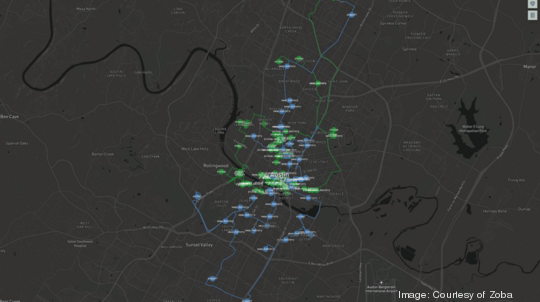
In 2017, Spin was a San Francisco startup aiming to raise a Series A fund to try to bring dockless bikes to cities around the U.S.
Four years and a Ford acquisition later, the micromobility revolution has exploded, and firms like Spin are now orbited by a new ecosystem of support and technology companies that are starting to bring in significant capital of their own.
One startup that aims to be the behind-the-scenes technological backbone of the micromobility industry is Zoba, a Boston company formed out of MIT and Harvard. Zoba is helping companies like Spin optimize where and how their vehicles get used.
Zoba announced this week that it closed a $12 million series A funding round, led by Palo Alto, California venture firm NTTVC.
The startup helps mobility firms work with over 150,000 vehicles in more than 150 cities, using an AI model that measures and considers users’ habits, weather, local policies and restrictions and more, feeding that information into an optimization engine which helps the operators make decisions about where to move and how to use their bikes or scooters.
In the startups’ early days, its employees were looking at demand responsive mobility and delivery systems in general, basing its research on systems like those used for car sharing. Then the micromobility boom hit in 2018.
“We were really well-poised to take advantage of that timing, and we'd already kind of developed quite a bit of expertise and started to really grow from there and were able to raise $3 million dollar seed round in early 2019, on the back of some of that early technological traction,” said cofounder Joseph Brennan in an interview. “Now we’ve proven that it works, it works at scale, and we’re in the process of scaling up.”
Spin has been the flagship customer of Zoba, Brennan said. The two had partnered on pilots and experimentation starting in 2019, but formalized the relationship earlier this year, according to Spin’s senior vice president of operations, Brandon Mah.
“They’re at a spot, specifically focused on this problem, so with their agility they can move a little bit quicker,” said Mah. “Our usage of Zoba in 2021, integrating that into our business process has, we believe, raised the utilization of scooters from where it would have been had we just been using local knowledge or intuition or other manual ways to decide where and when to place scooters.”
There’s an irony in the company being based in Boston, a city that’s been challenging for micromobility operators trying to open up shop. Zoba’s partners bring it up often, said Brennan
“It’s been a little bit surprising for us. I actually think Boston’s a pretty good market. The winters are tough, but in many cases you could adjust for that,” said Brennan.
With the new capital, Zoba is aiming to expand to around 60 employees, and recently opened an office in Berlin. The company is eyeing markets beyond micromobility, like demand-responsive transit, autonomous vehicles, ride hailing and delivery.
“As we deploy this new capital, the main priority is on scaling our current business … but we’re also going to be looking very carefully into some of these other spaces where we see the same core need and think we could also play a big role in those sectors,” said Brennan.
The company is named after a Chinese phrase translated to “let’s go.”
“We liked it because, like Zoba, it's about putting things in motion,” said Brennan.




